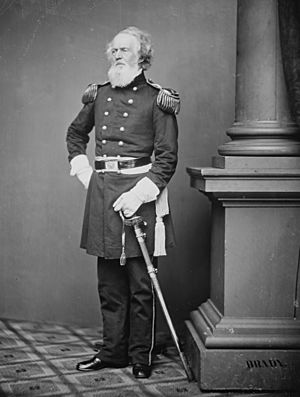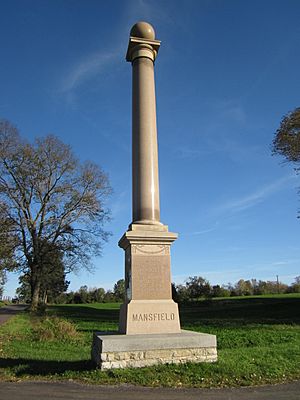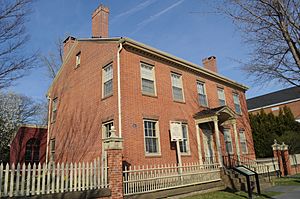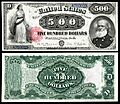Joseph K. Mansfield facts for kids
Quick facts for kids
Joseph K. Mansfield
|
|
|---|---|

Maj. Gen. Joseph K. Mansfield, photograph by Mathew Brady
|
|
| Born | December 22, 1803 New Haven, Connecticut, US |
| Died | September 18, 1862 (aged 58) Sharpsburg, Maryland, US |
| Allegiance | Union |
| Service/ |
United States Army Union Army |
| Years of service | 1822–1862 |
| Rank | |
| Commands held | Department of Washington XII Corps |
| Battles/wars | Mexican–American War |
Joseph King Fenno Mansfield (born December 22, 1803 – died September 18, 1862) was an important officer in the United States Army. He was also a civil engineer. During the American Civil War, he became a general for the Union. Sadly, he was badly wounded and died at the famous Battle of Antietam.
Contents
Early Life and Military Career
Joseph Mansfield was born in New Haven, Connecticut. When he was just fourteen, he started studying at the United States Military Academy at West Point. He was a very smart student and graduated second in his class of forty in 1822.
After West Point, he joined the United States Army Corps of Engineers. In the peacetime army, promotions were slow. He became a first lieutenant in 1832 and a captain in 1838.
Fighting in the Mexican-American War
Mansfield showed great bravery during the Mexican–American War. He earned special promotions for his actions.
- He became a major for his courage at Fort Brown, Texas, in 1846.
- He was wounded in the leg at the Battle of Monterrey and was promoted to lieutenant colonel.
- For his actions at the Battle of Buena Vista in 1847, he was promoted to colonel.
After the war, in 1853, he became the Inspector General of the U.S. Army. This was a very important job.
Civil War Service
When the American Civil War began, Joseph Mansfield was given command of the Department of Washington. This was a military area around the capital city. He was promoted to brigadier general in May 1861.
General Winfield Scott thought Mansfield should lead the volunteer army being formed in Washington. However, the command went to Irvin McDowell instead. Mansfield was considered a bit old for the job. Also, he was not sure about how well volunteer soldiers would fight.
After the Union army lost the First Battle of Bull Run, George B. McClellan took charge of the war effort in the East. Mansfield hoped to lead an army, but McClellan did not give him a command in the new Army of the Potomac.
Coastal Defense and New Command
Mansfield was sent to Hatteras Inlet, North Carolina, in October 1861. Later, from March to June 1862, he commanded a brigade in Virginia. His only combat during this time was when his coastal guns fired at the Confederate ironclad ship CSS Virginia. This happened during its famous battle with the USS Monitor at Hampton Roads on March 9, 1862.
Before the fall of 1862, Mansfield commanded a division near Suffolk, Virginia.
Maryland Campaign and Antietam
During the Maryland Campaign, Confederate General Robert E. Lee invaded the North. Joseph Mansfield was given command of the XII Corps of the Army of the Potomac. This happened on September 15, 1862, just two days before the Battle of Antietam.
Mansfield had 40 years of army experience, but he had not been in a recent battle. He had white hair and a white beard, but he was still very energetic. Some of his officers thought he was a bit nervous. However, his soldiers, many of whom were new recruits, liked him because he seemed enthusiastic and like a father figure.
The Battle of Antietam
On the morning of September 17, 1862, the I Corps attacked the Confederate army. Mansfield's XII Corps followed right behind them. As the lead soldiers moved through a field, Confederate cannons fired at them. Many of the new soldiers were hit.
The troops were marching in a column, which is good for moving, but not for fighting. Their officers told them to spread out into battle lines to avoid more cannon fire. But Mansfield told them to stay in column. He worried that if they spread out, the new soldiers might run away. This decision meant more soldiers were packed together when they attacked the Confederate lines.

Mansfield personally led some troops into the East Woods. He then went back to bring up more soldiers. When he returned, he saw soldiers from the 10th Maine Infantry firing into the woods. Mansfield thought they were firing at their own men from another Union corps. He rode along their line, shouting, "You are firing on our own men!"
The soldiers convinced Mansfield that they were not. They told him they were receiving heavy fire from the woods. Mansfield replied, "Yes, yes, you are right." Just then, his horse was hit, and a bullet struck him in the right chest.
Mansfield's Final Moments
The general was badly wounded. He rode his bleeding horse away from the fighting until he met some soldiers from the 125th Pennsylvania. They saw he was hurt and helped him off his horse. Five men gently carried him to a tree behind their lines to wait for a doctor.
He was taken to a hospital set up on a farm in Sharpsburg. Sadly, he died there the next morning. He was buried in Connecticut. After his death, he was promoted to major general for his bravery at Antietam.
Legacy
Fort Mansfield, a coastal artillery base in Rhode Island, was named in his honor. Mansfield Avenue at the Antietam National Battlefield also carries his name. Even a baseball team in Middletown, Connecticut, the Middletown Mansfields, was named after him.
Images for kids
 | Madam C. J. Walker |
 | Janet Emerson Bashen |
 | Annie Turnbo Malone |
 | Maggie L. Walker |



